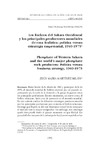Identificador persistente para citar o vincular este elemento:
https://accedacris.ulpgc.es/jspui/handle/10553/56288
| Título: | Los fosfatos del Sahara Occidental y los principales productores mundiales de roca fosfática: política versus estrategia empresarial, 1969-1975 | Otros títulos: | Phosphate of Western Sahara and the world’s major phosphate rock producers: Politics versus business strategy, 1969-1975 | Autores/as: | Martínez Milán, Jesús María | Clasificación UNESCO: | 531209 Minería 530401 Consumo, ahorro, inversión 550402 Historia contemporánea |
Palabras clave: | Fosfato Sahara Occidental Minería Marruecos Estados Unidos, et al. |
Fecha de publicación: | 2019 | Publicación seriada: | Estudios de Asia y Africa | Resumen: | Entre finales de la década de 1960 y principios de la de 1970, el mercado mundial de fosfatos atravesó por un periodo caracterizado por la caída de la demanda y la guerra de precios entre los principales productores. En esos momentos, un nuevo actor, el fosfato sahariano, hacía acto de presencia en el mercado mundial. En este artículo analizo las diferentes estrategias puestas en marcha por los principales productores para controlar el fosfato sahariano. Sostengo que España se alió con Marruecos con el fin de compartir el mercado con su mayor competidor. Sin embargo, esta estrategia quedó desvirtuada desde el preciso momento en que Madrid dio prioridad a los intereses de la industria de fertilizantes española sobre los de Fosfatos de Bu Craa, S.A. (Fosbucraa). Todo ello al comienzo de una nueva coyuntura marcada por la salida de España del Sahara y la caída de la cotización internacional del fosfato. Between the end of the 1960s and the beginning of the 1970s, the world’s phosphate market went through a period characterized by a fall in demand and a price war between the major producers. At that time, Saharan phosphate burst onto the world market. In this paper, I intend to analyze the strategies used by the major producers to control Saharan phosphate. I argue that Spain allied with Morocco in order to share the market with its biggest competitor. However, this strategy began to fail as soon as Madrid prioritized the interests of the Spanish fertilizer industry over those of Fosfatos de Bu Craa, S.A. (Fosbucraa). All this took place at the beginning of a new era marked by the withdrawal of Spain from Sahara and a fall in the international price of phosphate. |
URI: | https://accedacris.ulpgc.es/handle/10553/56288 | ISSN: | 0185-0164 | DOI: | 10.24201/eaa.v54i2.2396 | Fuente: | Estudios de Asia y Africa [ISSN 0185-0164], v. 54 (2), p. 303-328 |
| Colección: | Artículos |
Citas SCOPUSTM
3
actualizado el 08-jun-2025
Visitas
117
actualizado el 11-ene-2026
Descargas
85
actualizado el 11-ene-2026
Google ScholarTM
Verifica
Altmetric
Comparte
Exporta metadatos
Los elementos en ULPGC accedaCRIS están protegidos por derechos de autor con todos los derechos reservados, a menos que se indique lo contrario.
